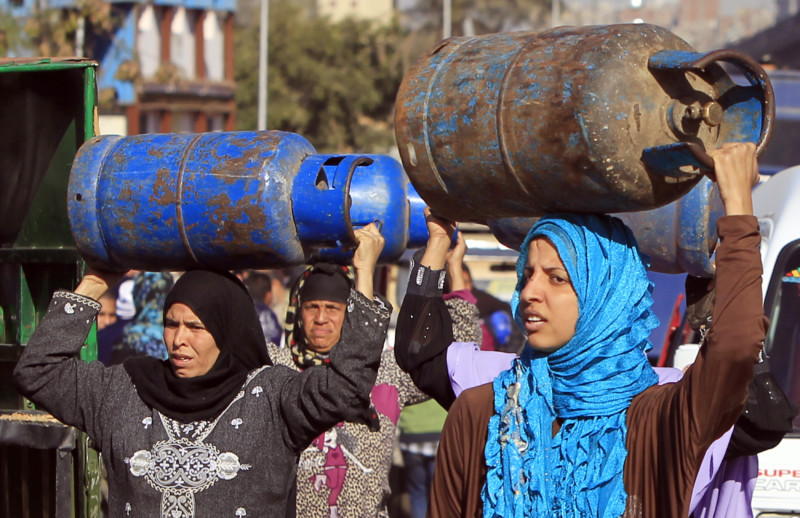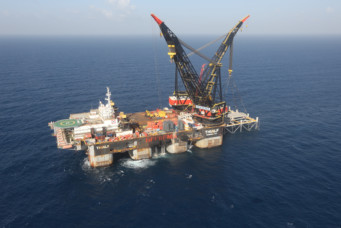A New Dawn in Egypt?
Ambitions and challenges facing Egypt in becoming a regional gas hub

Women carry gas cylinders to be refilled at a distribution point in Cairo, Jan.19, 2015. Mohamed Abd El Ghany/Reuters
The access to energy resources has unquestionably long been a driver of foreign policy for nations and, given the growing energy demand worldwide, this is unlikely to change in the near future, according to experts in energy geopolitics. The challenge for any state is working out how to use energy as a geoeconomic asset and to successfully turn it into both a source of income and of state power.
Egypt’s energy problems are sufficiently serious to warrant the government’s full attention given that solving them is of crucial importance for the economic development of the nation and the welfare of its citizens. It is no secret that Egypt faces many challenges, both internal and external, including soaring inflation, a currency crash, and subsidy cuts that have made fuel, electricity, and water more expensive. Unemployment in Egypt and the Arab World is likely to remain high in the foreseeable future as millions more young people stream into a strained job market.
But now there is a ray of hope emerging, and it comes in the form of a windfall natural gas discovery with the potential to boost Egypt’s limping economy and build a new commercial alliance with Eastern Mediterranean countries and Israel. In recent years, the Eastern Mediterranean region has become one of the world’s hottest offshore drilling zones, with a string of major gas discoveries in the territorial waters of Israel, Lebanon, and Cyprus. Egypt struck the jackpot in 2015 with the discovery of a giant reservoir known as Zohr, which has developed into one of the largest single gas fields in the Middle East.
In October 2018, Egypt, Greece, and Cyprus agreed to establish an East Mediterranean Gas Forum which will be headquartered in Cairo. The forum will include among its members all countries that import and produce Eastern Mediterranean gas, as well as transit countries. They include Cyprus, Greece, Israel, Italy, Jordan, and Palestine.
Egypt now produces a record 6.3 billion cubic feet of gas a day (bcfd)—up by more than 30 percent since 2016— making it one of the biggest producers in North Africa and the Middle East. In January 2019, for the first time in several years, Egypt exported more gas than it imported.
In August 2019, production from the Zohr field, the largest gas discovery ever made in Egypt and the Mediterranean Sea, reached more than 2.7 bcfd, and has the potential to increase its gas production to 3.2 bcfd by the year’s end, according to Italian energy firm ENI, which is overseeing the project. This discovery will allow the country to transition from being an importer of natural gas to an exporter. What are the chances of Egypt becoming a regional gas hub in the Eastern Mediterranean? To answer this question, it is necessary to first highlight some general characteristics and challenges that the gas sector faces. First, it is important to consider that Egypt has a vast domestic market it needs to supply. The main challenge that Egypt faces is its overpopulation which further fuels energy demand. The country’s population has reached 100 million and is expected to reach 128 million by 2030; the projected population growth will lead to a considerable increase in electricity demand and thus the power sector will need more gas in the future. One of the major systemic defects of the Egyptian gas market has been the high level of state subsidies on gas, which has led to a sharp increase in consumption. The removal of these subsidies by the government has started, and it is imperative that the country continue on its path of comprehensive reform. It should also continue its efforts to offer an appealing business climate for foreign companies to attract further investment.
Ambitions and Challenges
In a televised speech last year, Egyptian President Abdel-Fattah El-Sisi highlighted the country’s hopes of becoming a regional gas hub. First, it is imperative that Egypt provides a politically stable environment as well as an appealing business climate for foreign companies. Furthermore, Egypt’s aspiration to become a gas hub should be accentuated more in its overall foreign policy for it to become a real player in regional energy politics.
Second, the country’s population jump from 79 million in 2007 to 100 million in 2019 is creating huge energy demands. This situation will certainly bring about new challenges in the energy sector. To this end a new gas regulation law was issued in 2017 which can be considered as a major step for the inevitable modernization and restructuring of the Egyptian gas market and its regulation. This will fix one of the major defects of the Egyptian gas market which used to be the overreliance on gas subsidies, which has provided cheap access to gas for decades and led to a sharp increase in consumption.
What are Egypt’s Advantages?
Egypt has liquification capacities that give it a strategic advantage. Furthermore, Egypt’s geographical location—straddling Africa, the Middle East, and the Eastern Mediterranean, and having access to two seas and the Suez Canal—is undeniably a good basis for becoming a gas hub, provided that the country has significant gas reserves. Interestingly, Egypt’s hopes of being a future gas hub are shared by the European Union, which aims to diversify its own energy supplies and which considers Egypt a potential partner.
Additionally, Zohr plays a key role in helping Egypt avoid the need to import liquefied natural gas (LNG). According to U.K.-based stockbroker Wood Mackenzie’s Chairman Simon Flowers, writing in Forbes in April last year, “Egypt has assumed unprecedented importance in both ENI’s and BP’s global portfolios.”
Another advantage is that Egypt’s policy action for turning itself into a regional gas hub could reinforce its power position in the region, enabling it to use its potential in natural gas as a bargaining chip in foreign relations.
In other words, Egypt under President El-Sisi is poised to become a regional LNG trading hub thanks to booming natural gas production from recent discoveries, existing LNG infrastructure and strategic agreements with Eastern Mediterranean countries to import gas for processing and re-export. The gas boom could help Egypt geopolitically as well, allowing President El-Sisi to strengthen economic ties with Israel and Jordan while becoming an indispensable partner to Europe. The windfall has the potential to stabilize Egypt’s precarious debt-laden finances and help clean up its polluted air. But unfortunately, the gas windfall is barely reflected on the streets of Cairo, where the government has failed to put a dent in high unemployment or halt the deterioration of public services.
Mona Makram-Ebeid is a distinguished lecturer of political science and sociology at theAmerican University in Cairo. She served on the National Council on Human Rights, as member of the Egyptian senate in 2013, and was an MP for five years. She also served, among other roles, as an advisor to the World Bank, a consultant to the Center for Strategic International Studies in Washington D.C., and a regional expert for the UN.
Read MoreSubscribe to Our Newsletter




